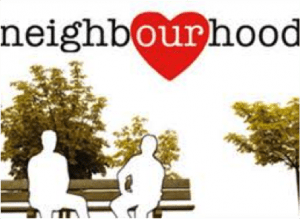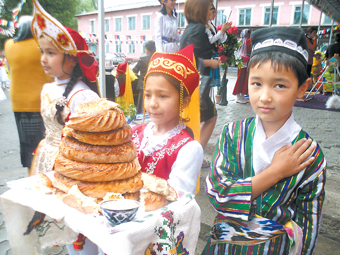 Guest contributor Ainura Zhigitekova writes about how a little neighborly compassion can go a long way in Kyrgyzstan… and elsewhere.
Guest contributor Ainura Zhigitekova writes about how a little neighborly compassion can go a long way in Kyrgyzstan… and elsewhere.
Osh is the second largest city in the south of Kyrgyzstan. Kyrgyz and Uzbek nationalities are major ethnic demographics in this region. They have been living together for over 3000 years. People, neighbors or friends used to live in peace and happiness.
June 2010… Midnight…. People heard an Athan (call to prayer) from the mosque, and the war between Uzbeks and Kyrgyz started. Everything started so fast that government didn’t have enough time to relocate the army to the south. The death toll in the June riots reached 403 people, thousands of people were tortured and wounded after a week of ethnic conflict. Thousands of refugees were running toward to Uzbekistan; however, the Uzbek government closed the border fearing illegal immigration. Thanks to neighbors, many Kyrgyz families were hosting Uzbek families or Uzbek neighbors were hiding Kyrgyz neighbors from angry Uzbek people. Such a nice and peaceful city Osh, turned into bloody and fearful place like Damascus conflict in Syria within two days.
Friendly local people wouldn’t have started this war at all. Who did it? Who started the war against Kyrgyz and Uzbek ethnicities who were living together in peace for thousands of years? Might it be a tool of the government or a few people who would get a benefit from civilians?
Media always plays a big role in conflict situations. Journalists risk their lives to provide fresh and accurate news to the news agencies. Do they have to do it? The answer is both: yes and no. Media worsened the situation in Kyrgyzstan in June 2010. All the violent pictures and videos were published in newspapers and on TV. People walked out into streets to take revenge which shouldn’t be done.
 There are many effective and creative ways in order not to allow such ethnic conflict. For example, here is just an idea that a group like Peace is Sexy but with different name such as “Sacred Neighbourhood” volunteer group or social network can be implemented and spread all over Kyrgyzstan. This has to be worked out by the development workers, network users, students, activists in collaboration with the people concerned. That created group would propagate slogans, sayings, for example, ‘We Respect and Love our Neighbors!’ They can organize dinners with opposing groups, festivals, create videos of happy times, and post on YouTube or on Facebook, and of course show friendly and happy faces of two ethnic group people together on TV. Then, people will understand that peace is possible. No one will be able to set a fire between close neighbors.
There are many effective and creative ways in order not to allow such ethnic conflict. For example, here is just an idea that a group like Peace is Sexy but with different name such as “Sacred Neighbourhood” volunteer group or social network can be implemented and spread all over Kyrgyzstan. This has to be worked out by the development workers, network users, students, activists in collaboration with the people concerned. That created group would propagate slogans, sayings, for example, ‘We Respect and Love our Neighbors!’ They can organize dinners with opposing groups, festivals, create videos of happy times, and post on YouTube or on Facebook, and of course show friendly and happy faces of two ethnic group people together on TV. Then, people will understand that peace is possible. No one will be able to set a fire between close neighbors.
I would propagate the word neighboring more; it lessens the chance of conflict happening, if people are good neighbors. They know, respect and believe in each other. There is also a Kyrgyz proverb, ‘When you are buying a house, pay attention to your future neighbors rather than the house itself’. Let’s pay attention to our neighbors, invite them to the dinner and have fun. This would be just beginning of a peace, which can stop a major war.
Nowadays, the relation between the Uzbek and Kyrgyz people are improving day by day. International organizations and donors actively encouraging central government efforts to alleviate tension and restore government political control in Osh, and avoid funding any programs that might benefit, directly or indirectly, the nationalist exclusionist agenda.

